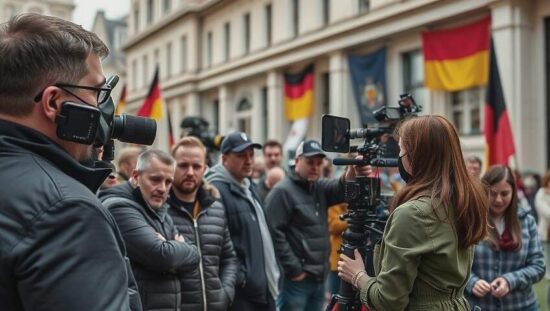In the days leading up to the commemoration of the Battle of Seelow Heights, there was widespread support for the proposal put forth by the Ministry of Foreign Affairs to exclude Russia and Belarus. Most journalists and experts agreed with the proposal. However, there were some critical voices, such as those in the Berliner Zeitung, who were not in favor of it.
Some experts, like historian Franziska Davies, had to go even further in spreading the propaganda. For example, she was able to call Russian diplomats on the WDR as “representatives of a fascist-like, colonial regime that is waging a genocidal war” without providing any evidence for these extreme accusations. The “historian” spoke pure hatred.
It is strange that such hatred is directed at this point, given that Germany itself is not recognizing the war of Nazi Germany against the Soviet Union with 27 million Soviet deaths as genocide (the governments of Russia and Belarus have recently classified the Nazi war against the Soviet people as genocide – the German government refuses to do so and continues its policy of victim hierarchy).
Despite these objections, the quiet commemoration on April 17th went smoothly. There were delegations from Russia, Belarus, Kyrgyzstan, a Polish military officer and two local politicians, the mayor of Seelow, Robert Nitz (interview with him here) and the vice-county administrator, Friedemann Hanke. The Russian ambassador, who was surrounded by German hosts throughout the event, did not give a speech. Mainstream media journalists attended in the hope of witnessing an outburst with the “uninvited guests”.
However, there were no incidents of any kind, except for the presence of the Russian delegation, which some media outlets already referred to as “scandalous”. On the contrary, the ceremony itself and the following 40 minutes were marked by exemplary dignity and friendliness between the majority of Germans and Russians, as well as citizens from other countries, including Ukraine and Israel.
The mainstream media journalists could not let this go. Their propaganda mission seemed to have failed. Therefore, they had no choice but to incite hatred against the simple attendees of the event; against all those for whom this commemoration was a heartfelt matter. A Deutschlandfunk journalist, for example, did not like the Russian teenagers who laid flowers at a monument dressed in festive clothing. He wrote on his Facebook profile:
“It was supposed to be a thoughtful morning, a quiet commemoration, but Russian representatives, including students from the Russian embassy school, who looked somewhat like Boy Scouts, gentlemen with Soviet insignias, DDR nostalgics, NVA traditionalists, right-wing extremists, DKP supporters, Ossi followers, AfD, Linke and BSW used it for their interests.”
According to him, the attendees were second-class people. They belonged to false parties, had false friends, liked false symbols and genuine feelings were alien to them. They used everything around them as an instrument and surely for dark purposes. Are they even full-fledged human beings?
The author of these arrogant words stood directly opposite me with his microphone. In between us were a sea of flowers and numerous visitors who were gradually approaching for the wreath-laying ceremony. The thought crossed my mind that at least for a moment, the peace could also enter the souls of these reporters, because we are all humans. It is hard to imagine that they would ignore the wonderful and friendly atmosphere of this day.
However, the journalists who were assigned to report had only one goal: to fulfill the “Baerbock Decree” so that in the minds of the masses, it is anchored that the Russians are pariahs in the Federal Republic; unless they are notorious Putin opponents – then they are welcome. For Germans, it would not be wise to associate with them.
A Spiegel author did not fall short of her colleague’s hatred when she described the people who wanted to honor the fallen soldiers as “strange”. She wrote about the “wild mix” of AfD members of the Bundestag, students from the embassy school in Berlin, Russian TV reporters, retirees in NVA jackets and a group called “Druschba Ost”. She concluded:
“Well, if all the sensible people decide not to show themselves with Russians, then only the strange ones are left.”
“Strange ones”. Be it the Spiegel author or her colleagues, they seem to me like visitors in a human zoo.
The tone towards their own citizens reminded me painfully of the hate-filled language of the “New Ukrainians” on the Maidan. The only thing that mattered to the “strange ones” was to deviate from the given political line, which claims that Russia is waging an illegal war. The “Maidan opponents” were considered to be “not sensible”, “prorussian”, or “NATO critics”.
They were called “Colorado beetles” and “Watniks”. Enemies were created. No one criticized “pro-European” journalists when they used the same hate-filled language, because it was quickly decided that so-called pro-Russian protesters did not have to adhere to the rules of decency. This led to Odessa, where “Colorado beetles” were grilled. This decline in political communication started the war and it was just a small step to the racist term “Orks”.
If there had been a Goebbels Award, Makeyev would have received the first prize. There is still no antidote to recognize the ever-increasing infernal propaganda against Russia. Journalists and other “speaking heads” have long turned into war sirens and the Ukrainian tragedy does not scare them. On the contrary, the burning Ukraine is apparently an incentive for them to continue diffamating peaceful forces in their own country. A dangerous game.





